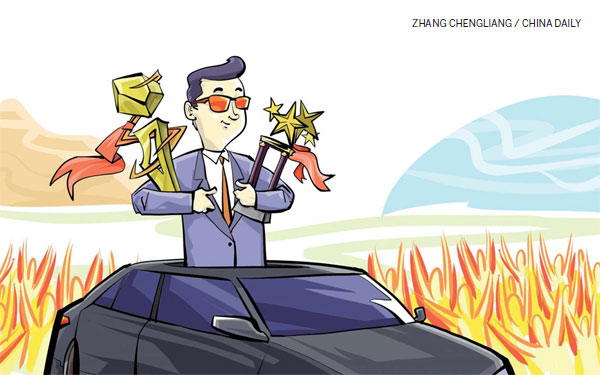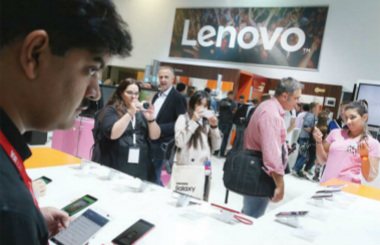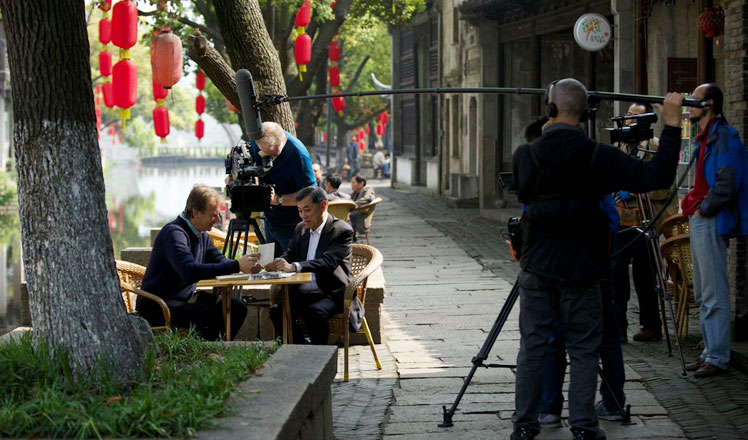Acquisition bandwagon continues to roll
Updated: 2016-01-22 08:38
By Mike Bastin(China Daily Europe)
|
|||||||||||

Western media obsession with macro figures is obscuring the giant leaps Chinese companies are making overseas
Despite 2016 starting with a continuation of relatively negative economic news, it is surprising that reports of Chinese company takeovers of totemic international companies and their brands have received so little media coverage in the West.
The widespread coverage of China's latest GDP figures - 6.8 percent in the fourth quarter of 2015 from a year earlier, down from 6.9 percent in the third quarter and the weakest pace of expansion since the first quarter of 2009 - and other supposedly informative macro indicators such as the purchasing managers index, which has dipped below 50 in recent months, is particularly disappointing given almost universal acceptance that modernization of emerging market economies and their business practices and culture go hand in hand with internationalization.
It is, therefore, of critical importance that Chinese companies continue to expand internationally, and that this expansion involves more and more overseas markets and a multitude of Chinese companies from a wide variety of industrial sectors.
So far this year, Chinese companies have not disappointed: There have been three major international takeovers in only the first few weeks of January.

Most impressive of these is the audacious move by household appliance manufacturer Haier to acquire General Electric's appliance unit for a staggering $5.4 billion. The takeover signifies clear strategic intent on Haier's part to conquer markets both East and West.
Crucially, this deal allows Haier to use the GE brand and all aspects of the brand identity for its appliances for 40 years.
Undoubtedly, Haier will now have a golden opportunity to learn from GE's global success. GE's advanced manufacturing technology and impressive brand building provide major learning opportunities that should enable Haier to emulate GE's global presence in the years to come.
Media coverage should also highlight the fact that Haier appears to have outbid others to secure this takeover, and in so doing catapult past Electrolux and other rivals in the US market. Haier now has its sights firmly on US market leader Whirlpool.
Then there is the takeover of German manufacturing giant KraussMaffei for a not inconsiderable sum of $1 billion. This stands as one of the largest takeovers by a Chinese company of a world renowned German industrial leader. A consortium of Chinese companies appears to be behind this deal, including China National Chemical Corp. This is also another good sign, where Chinese companies, in their quest for the international expansion that will accelerate their modernization, accept the need for working in clusters to achieve the critical mass often necessary to make that quantum leap in development and progress.
Clearly, Chinese companies are targeting takeovers that present long-term learning and strategic re-positioning opportunities, and the KraussMaffei acquisition is yet another example. The KraussMaffei Group is widely recognized as one of the leading producers worldwide of machines and systems for the production and processing of goods such as plastic and rubber.
That has followed by the news that Chinese conglomerate Dalian Wanda had reached an agreement to take ownership of Hollywood-based Legendary Entertainment for $3.5 billion. This is not only the largest Hollywood takeover to date by a Chinese company, it is also one of the most sizeable deals for which a cash payment will be used to effect transfer of ownership.
Despite the size and significance of these three most recent deals, this Chinese takeover activity should not be viewed in isolation. Instead, much more media coverage of this growing trend is needed in order to present a far more balanced and insightful picture of the real Chinese economy.
In recent years, many of the world's most famous brands have been acquired by hungry band of Chinese companies. Just a few examples of this trend are Pirelli, Volvo, Ferretti and Ferragamo.
Today's Top News
Global push
AIIB chief vows to run clean, lean, green institution
'More Europe' to deal with 'triple crisis'
China gives beleaguered Tsipras a helping hand
China injects note of confidence in Davos
China and Gulf nations resume free trade talks
IMF starts to select new chief
Merkel insists on European solution for refugee crisis
Hot Topics
Lunar probe , China growth forecasts, Emission rules get tougher, China seen through 'colored lens', International board,
Editor's Picks

|

|

|

|

|

|






